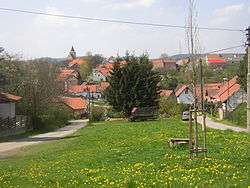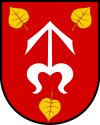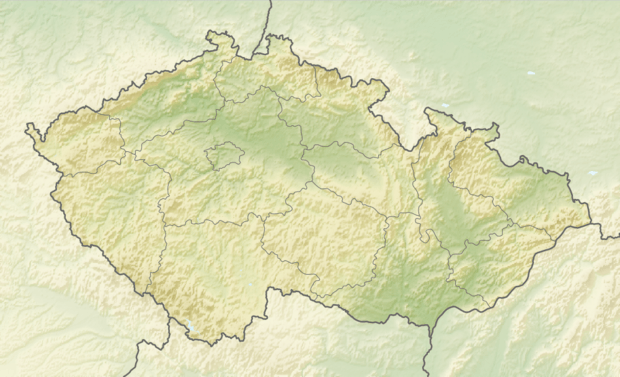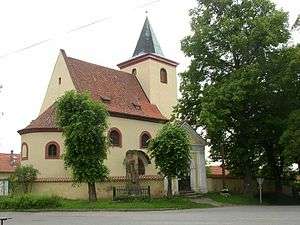Hrusice
Hrusice (Czech pronunciation: [ˈɦrusɪtsɛ]) is a village and municipality in the Central Bohemian Region of the Czech Republic. It is located about 30 km southeast of Prague and 11 km southeast of Říčany. The population as of December 31, 2007 was 570.[1] Popularized through paintings, ubiquitous Christmas and Easter postcards and children's books by national artist Josef Lada, the name, and appearance of Hrusice has become since the 1930s familiar to almost every Czech, which gives Hrusice a somewhat unusual position among thousands other villages in the country.
Hrusice | |
|---|---|
Village | |
 Hrusice as seen from east | |
 Flag  Coat of arms | |
| Etymology: Hruša's people | |
 Hrusice Location in the Czech Republic | |
| Coordinates: 49°54′36″N 14°44′17″E | |
| Country | Czech Republic |
| Region | Central Bohemian |
| District | Prague-East |
| First mention | 1205 |
| Government | |
| • Mayor | Petr Sklenář |
| Area | |
| • Total | 5.43 km2 (2.10 sq mi) |
| Elevation | 365 m (1,198 ft) |
| Population (2007) | |
| • Total | 570 |
| • Density | 100/km2 (270/sq mi) |
| Time zone | UTC+1 (CET) |
| • Summer (DST) | UTC+2 (CEST) |
| Postal code | 251 66 |
| Website | www.obec-hrusice.cz |
Location
The village is situated in rolled landscape characteristic for the region southeast of Prague. It borders to municipality of Mnichovice in the north, Ondřejov in the east, Senohraby in the south and Mirošovice in the west. The average annual temperature is 7.3 °C and average annual rainfall 620 mm. The accessibility of Hrusice is very good due to proximity of two major transport lines. The D1 motorway from Prague to Brno passes through cadastre of Hrusice just several hundred metres southwest of the village (the closest interchange is on km 21 in Mirošovice, about 3 km by car from Hrusice). Mirošovice u Prahy railway station on km 32 of Prague - Benešov - České Budějovice line is about 1,5 km by foot from Hrusice. Trains run each half-hour on workdays and hourly on weekends, a ride from or to Prague Main Station takes up 43 minutes, to Benešov in the opposite direction it takes up 27 minutes. There also operates a suburban bus line number 490 between Strančice and Stříbrná Skalice (via Mnichovice and Ondřejov) with stop in centre of Hrusice.
History
Hrusice was first mentioned in 1205, when Přemysl Otakar I, King of Bohemia, confirmed some local property to Ostrov Monastery. Josef Lada, one of the most respected Czech painters and writers was born into family of local shoemaker in 1887. Hrusice where he spent his childhood and the surrounding landscape are reflected in many of his works. The village has experienced a significant growth in recent decade thanks to good connection to the capital city, but its picturesque skyline is still well preserved, which makes Hrusice with dense net of marked hiking paths a favourite destination for family trips from Prague.
Population
According to the 2001 census.[2] the population was 382, almost exclusively Czechs with two people declaring themselves to be of Slovak and German ethnicity. 63% of population was without religion, 24% belonged to Roman Catholic Church, 1% to other religious groups, 10% gave no response.
Sights
- Church of Saint Wenceslas in the centre of the village is an example of rural Romanesque architecture from the turn of the 12th century with a valuable sandstone portal, a work by monks from Sázava Monastery.
- Josef Lada Memorial in artist's villa in southern end of Hrusice, nowadays a branch of Prague-East Regional Museum, presents his life and work as well as his daughter Alena Ladová, also a renowned illustrator.
Gallery
 Centre of the village as seen from the south
Centre of the village as seen from the south Houses in centre of the village
Houses in centre of the village Centre of the village with bus stop
Centre of the village with bus stop Josef Lada was born here
Josef Lada was born here Church of St Wenceslas from the north; World War I memorial in front of the wall
Church of St Wenceslas from the north; World War I memorial in front of the wall Church from the east
Church from the east Romanesque portal made of red sandstone
Romanesque portal made of red sandstone Interior of the church
Interior of the church Small park in centre of the village with seat of local administration and bust of Josef Lada
Small park in centre of the village with seat of local administration and bust of Josef Lada Lada's summer vila in southern end of the village, nowadays his museum
Lada's summer vila in southern end of the village, nowadays his museum Rectory opposite to the church
Rectory opposite to the church U Sejků Pub with murals in style of Lada, building of former school in the background
U Sejků Pub with murals in style of Lada, building of former school in the background Bust of Josef Lada (1998)
Bust of Josef Lada (1998)- World War I memorial (1921)
 Protected lime (1777)
Protected lime (1777)